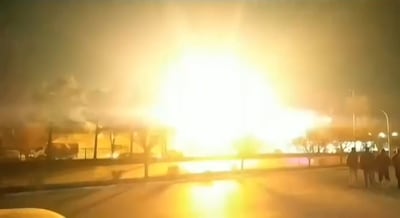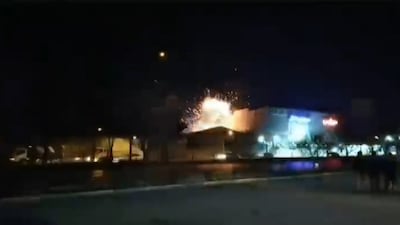Iran blames a foreign security service for training and arming a Kurdish group in Iraq to carry out a drone attack on a weapons depot near the central city of Isfahan, state-run Nour News reported on Wednesday.
It said three quadcopter drones loaded with bombs attacked a Defence Ministry complex in Isfahan on Saturday, with at least one hitting the roof.
The equipment and explosives were brought into the country with the help of “Kurdish anti-revolutionary groups” in Iraqi Kurdistan under orders from a “foreign security service”, according to the Nour News report.
It did not identify the country blamed by authorities but in the past Iran has accused Israel of “using bases in the northern region of Iraq to its advantage”.
Iran downplayed Saturday's attack and said that some drones were shot down while others caused only “minor damage” to the workshop roof.
It offered no other details on the attack, which occurred as a large fire broke out at an oil refinery in north-western Iran.
Iran accused the Kurdish group of receiving parts, microchips and explosive materials that were smuggled into the country from one of the “inaccessible routes” in the north-west of Iran.
It has previously accused Kurdish groups in Iraq of instigating anti-government protests over the death of Mahsa Amini, in police custody in Tehran in September.

In response, Iran’s Islamic Revolutionary Guard Corps has launched several drone and missile attacks on what it calls “separatist terrorists” in northern Iraq.
Saturday's attack bore the hallmarks of another last February when six quadcopter drones carrying explosives hit a manufacturing and storage plant for military drones near the city of Kermanshah. Israel was accused of carrying out that attack.
Last year, the IRGC fired rockets at a house in Erbil, the capital of the Kurdish Region of Iraq, that they said was an Israeli intelligence base for mounting attacks in Iran.
Iran last April executed four people and imprisoned three others accused of working for Israel’s Mossad intelligence agency. The four Iranians who were hanged were Hossein Ordoukhanzadeh, Shaahin Imani Mahmoudabad, Milad Ashrafi Atbatan, and Manouchehr Shahbandi Bojandi.
Dr Hamidreza Azizi, an expert on Iran at the German Institute for International and Security Affairs, said the attack could be a ploy by Israel to advertise its tough-on-Iran credentials to partners who might otherwise criticise it over its policies against Palestinians.
“Considering Iran's involvement in the war in Ukraine by supporting Russia, even the Europeans and the United States are feeling the importance of addressing these elements of Iran's activities more strongly than before. In the past, especially Europe was mostly concentrated on Iran's nuclear programme,” he told The National.


